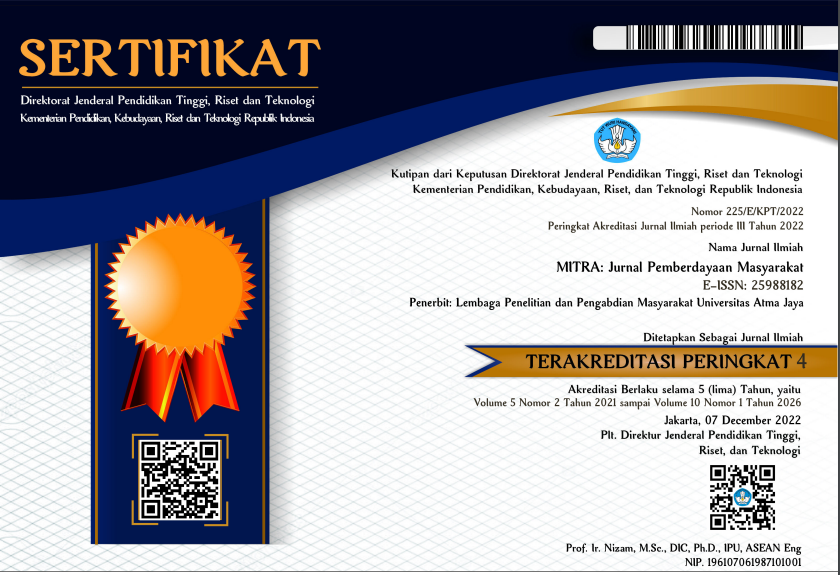Secercah Hati: Community Empowerment Program in Health and Economic Affairs through the Role of Posyandu and Posbindu
Community Empowerment Program in Health and Economic Affairs through the Role of Posyandu and Posbindu
DOI:
https://doi.org/10.25170/mitra.v3i2.888Keywords:
community empowerment, women's empowerment, women's entrepreneurship communityAbstract
The poverty level of urban communities, indicated by the high rate of maternal and infant mortality, the presence of stunting problems, and the poor health of the elderly in the Cibereum Village, Cimahi City, have an impact on the lack of concern for individual health and environmental health. The Secercah Hati program is created with the purpose of overcoming such problems. This program is a community empowerment program to create a healthy, knowledgeable, and prosperous society by increasing the role of women. It is collaborating with the Cimahi City Government Program, based on the 2017-2022 Cimahi City Medium Term Development Plan (RPJMD). Furthermore, the Secercah Hati Program is also an implementation of a partnership which is not only between Jenderal Achmad Yani University and the Cimahi City Government but also with Pasundan University. The program attempts to solve the issues by improving the role of Posyandu and Posbindu. The method of activity begins with a situation analysis that is coordinated with Cimahi City Government, problem identification, gathering and analyzing needs, determining priority problems, providing solutions, implementing, and evaluating. This participatory empowerment activity was carried out by forming a women's community consisting of Posyandu and Posbindu managers. Empowerment was implemented through training, workshops, mentoring, and role play (theatrical), so that they could optimize their role in improving public health and the environment and supporting the family economy. They were taught the ability to produce culinary with strong branding and market products utilizing digital marketing. In addition, they learnt to manage capital to support business sustainability. The program has an impact on increasing the number of cadres and the level of community participation in Posyandu and Posbindu activities, increasing the number of women entrepreneurs and increasing community income. The success of this community empowerment program needs to be supported by the concept of exciting and measurable activities in order to get a positive response from the community. Mentoring activities would be conducted continuously until the community is accustomed to and able to run programs independently and this is one of the keys to success. Implementing activities that synergize the Regional Government, Universities, and the community have proven to make the community empowerment program more effective.
References
Antara, G. E. D. (2015). Peningkatan inovasi teknologi tepat guna dan program berbasis pemberdayaan masyarakat untuk memajukan industri kreatif di Bali. Jurnal PASTI, IX(3), 257–268.
Endriani, M., Said, A. & Ulum, M. C. (2015). Implementasi Program pemberdayaan masyarakat melalui posyantek (pos pelayanan teknologi) di Provinsi DKI Jakarta (Studi pada Badan Pemberdayaan Masyarakat dan Perempuan dan Keluarga Berencana DKI Jakarta). Jurnal Administrasi Publik (JAP), 3(12), 1997–2002.
Gunamantha, I. M. & Susila, G. P. A. J. S. (2015). Analisis dampak program pengembangan kecamatan terhadap pengentasan kemiskinan di Kabupaten Buleleng. Jurnal Ilmu Sosial Dan Humaniora, 4(1), 523–533.
Haryani, S. & Subkhan, I. (2007). Studi efektivitas pelaksanaan proyek penanggulangan kemiskinan perkotaan-rehabilitasi dan rekonstruksi masyarakat dan permukiman berbasis komunitas (P2kp-Rekompak) di Kabupaten Bantul, Yogyakarta. Jurnal Ekonomi dan Bisnis Indonesia, 22(1), 71–21. Retrieved from https://jurnal.ugm.ac.id/jieb/article/view/37072/21455.
Iswarawanti, D. N. (2010). Kader posyandu : Peranan dan tantangan pemberdayaannya dalam usaha peningkatan gizi anak di Indonesia. Jurnal Manajemen Pelayanan Kesehatan, 13(4), 169–173.
Kuncoro, A.& Kadar. (2016). Pengaruh Pemberdayaan perempuan dan peningkatan sumberdaya ekonomi keluarga. Buana Gender, 1(I).
Kurniawati, D. P., Supriyono, B. & Hanafi, I. (2013). Pemberdayaan Masyarakat di bidang usaha ekonomi (Studi pada Badan Pemberdayaan Masyarakat Kota Mojokerto). jurnal administrasi Publik (JAP), I(4), 9–14.
Maulida, Hermansyah, & Mudatsir. (2013). Komunikasi dan koordinasi kader dengan pelaksanaan posbindu lansia the relation between cadres ’ communication and coordination with the implementation of integrated coaching post. Jurnal Ilmu Keperawatan, 194–208. Retrieved from www.jurnal.unsyiah.ac.id.
Prawoto, N. (2012). Model pengembangan dan pemberdayaan masyarakat berbasis kemandirian untuk mewujudkan ketahanan ekonomi dan ketahanan pangan (Strategi pemberdayaan ekonomi pada masyarakat Dieng di Propinsi Jawa Tengah). Jurnal Organisasi dan Manajemen, 8(2), 135–154.
Rauf & Loa. (2014). Strategi pemberdayaan masyarakat melalui program pengembangan kecamatan (PPK) di Kecamatan Samatru Kabupaten Kolaka. Jurnal Perencanaan Wilayah, 1, 35–44.
Ridwan, M. (2012). Penguatan ekonomi masyarakat berbasis kelompok. Jurnal Ekonomi Pembangunan, 13(2), 207–217.
Suhat & Hasanah, R. (2014). Faktor-Faktor yang berhubungan dengan keaktifan kader dalam kegiatan posyandu (Studi di Puskesmas Palasari Kabupaten Subang). Jurnal Kesehatan Masyarakat, 10(1), 73–79.
Suman, A. (2007). Pemberdayaan perempuan, kredit mikro, dan kemiskinan : Sebuah studi empiris. Jurnal Ekonomi Manajemen, 9(1), 67–72.
Umayana, H. T. & Cahyati, W. H. (2015). Dukungan keluarga dan tokoh masyarakat terhadap keaktifan penduduk ke posbindu penyakit tidak menular. Jurnal Kesehatan Masyarakat, 11(1), 96–101. Retrieved from http://journal.unnes.ac.id/nju/index.php/kemas.
Widjajanti, K. (2011). Model pemberdayaan masyarakat. Jurnal Ekonomi Pembangunan, 12(1), 15–27.
Widodo, S., Bustaman, H. & Soengkono. (2011). Model pemberdayaan ekonomi perempuan keluarga nelayan miskin melalui penerapan teknologi tepat guna terpadu. Majalah Ekonomi, XXI(1), 13–24.
Downloads
Published
Issue
Section
License
This license allows reusers to distribute, remix, adapt, and build upon the material in any medium or format for noncommercial purposes only, and only so long as attribution is given to the creator. If you remix, adapt, or build upon the material, you must license the modified material under identical terms.



_.jpeg)

.png)
2.png)
.png)
.png)



